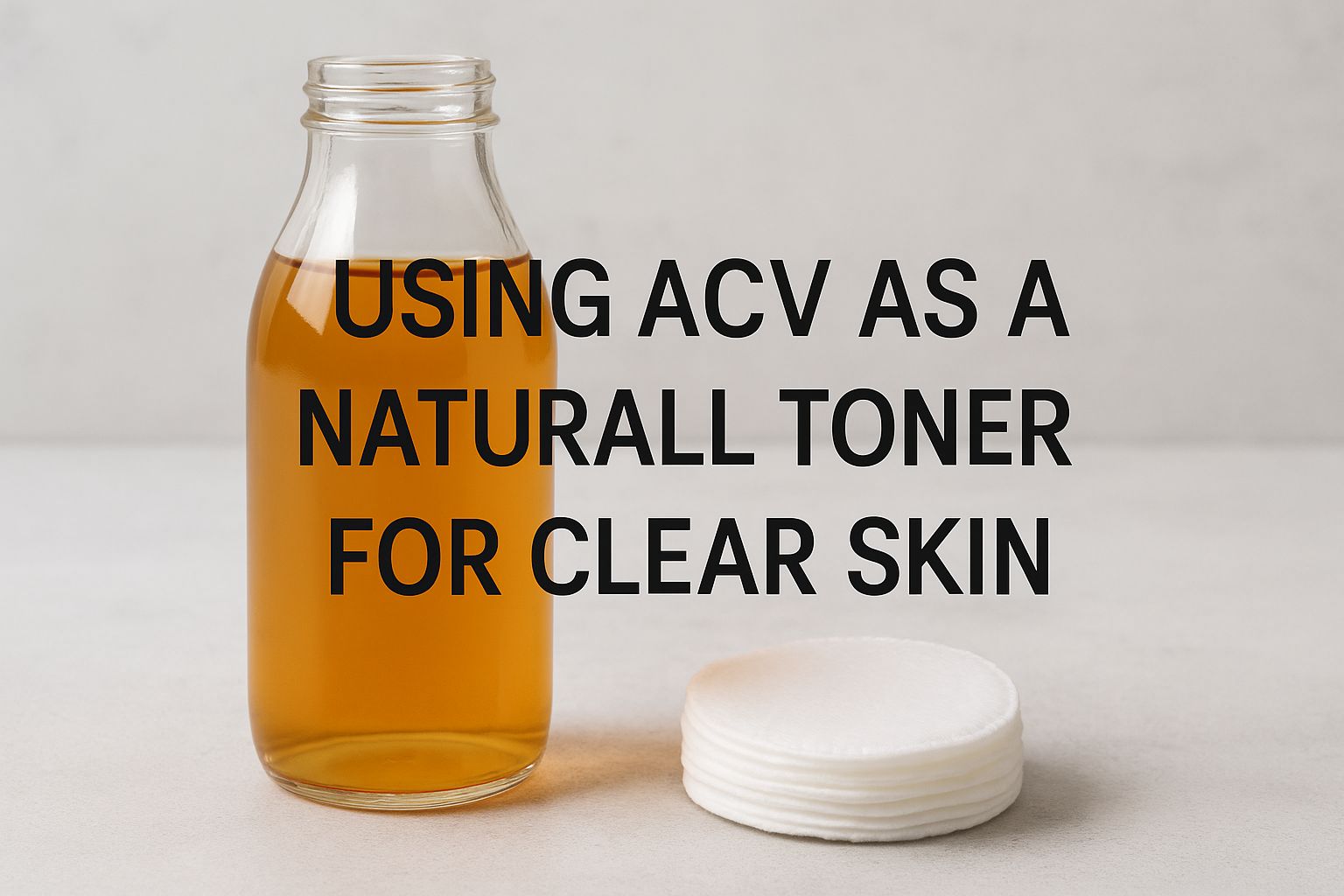"I’ve been looking for a natural and affordable solution for my skin, and this ACV toner sounds like a great…
Using ACV as a Natural Toner for Clear Skin
- Home
- Using ACV as a Natural Toner for Clear Skin

Using ACV as a Natural Toner for Clear Skin
In the world of skincare, natural ingredients have been gaining popularity for their effectiveness and affordability. One standout remedy that has been used for centuries is apple cider vinegar (ACV). Packed with beneficial properties, ACV is now commonly used as a natural toner to help promote clear, glowing skin.
In this article, we’ll explore how ACV works as a toner, its benefits, how to use it properly, and precautions you should take—especially if you have sensitive or acne-prone skin.
What is Apple Cider Vinegar (ACV)?
Apple cider vinegar is made from fermented apple juice. It contains acetic acid, vitamins, enzymes, and good bacteria that contribute to its antimicrobial and exfoliating properties. These natural components make it a valuable addition to any natural skincare regimen.
Benefits of Using ACV as a Natural Toner
Let’s break down the reasons why ACV makes an excellent natural toner:
1. Balances Skin pH
Your skin has a natural pH level of around 5.5, which helps protect it from bacteria and environmental toxins. Many skincare products can disrupt this balance. ACV, with its slightly acidic nature, helps restore and maintain your skin’s pH.
2. Fights Acne-Causing Bacteria
ACV contains acetic acid and malic acid, both of which have antibacterial and antifungal properties. When used regularly, ACV can help prevent acne and reduce breakouts by killing acne-causing bacteria.
3. Acts as a Gentle Exfoliant
ACV’s natural acids help dissolve dead skin cells, unclog pores, and encourage the turnover of new cells. This can result in a brighter, smoother complexion over time.
4. Reduces Inflammation and Redness
The anti-inflammatory properties of ACV can help calm irritated skin, reduce redness, and even soothe minor skin conditions such as rosacea or eczema (although more research is needed in these areas).
5. Minimizes Pores and Controls Oil
Using ACV regularly as a toner can help tighten pores and reduce excess oil production—especially helpful for oily or combination skin types.
How to Make an ACV Toner at Home
Making your own ACV toner is simple and cost-effective. All you need are two ingredients:
Ingredients:
- Raw, unfiltered apple cider vinegar
- Filtered or distilled water
Basic Recipe:
- Mix 1 part ACV to 2–4 parts water depending on your skin type. Start with a weaker solution (1:4) if you have sensitive skin.
- Store the mixture in a clean, airtight glass container.
Optional Add-ins:
- A few drops of tea tree oil (for acne-prone skin)
- Rose water (for a soothing effect)
- Aloe vera gel (for hydration and calming)
How to Use ACV Toner on Your Face
- Cleanse your face using a gentle face wash.
- Apply the ACV toner with a cotton pad or spray bottle—avoid the eye area.
- Let it dry naturally for a few minutes.
- Follow with your regular moisturizer or serum.
Use the toner once a day at first, preferably in the evening. As your skin adjusts, you can increase usage to twice daily if needed.
Precautions When Using ACV on Skin
While ACV can be a powerful natural remedy, it’s important to use it carefully:
- Always dilute ACV. Applying it undiluted can cause burns or irritation.
- Do a patch test before using ACV on your face. Apply a small amount to your inner arm and wait 24 hours.
- Avoid using ACV after exfoliating or if you’re using retinoids or acids (like AHAs/BHAs), as this may over-irritate your skin.
- Sensitive skin types should use higher dilution ratios (1:4 or more).
ACV Toner for Different Skin Types
1. Oily Skin
Use a 1:2 ratio of ACV to water. ACV helps control sebum production and reduce shine.
2. Dry or Sensitive Skin
Use a 1:4 ratio, and add aloe vera or rose water for extra hydration.
3. Acne-Prone Skin
You can enhance the toner with a drop or two of tea tree oil for its antibacterial benefits.
4. Combination Skin
Try alternating usage on different areas of your face depending on oiliness.
Frequently Asked Questions
Is it safe to use ACV every day as a toner?
Yes, but start slowly. Some people may only need it a few times a week, while others can tolerate daily use.
Can ACV replace my chemical exfoliants?
It can complement them but may not be as strong. Use ACV as a mild, natural exfoliant.
Will ACV lighten acne scars or hyperpigmentation?
ACV’s acids can help fade dark spots gradually over time, but results vary by skin type.
How long does it take to see results?
You may notice smoother skin within a week, but acne reduction and clearer skin can take several weeks of consistent use.
Final Thoughts
Apple cider vinegar is a time-tested, effective, and affordable option for those looking to incorporate more natural solutions into their skincare routine. Used properly, ACV as a natural toner can help balance your skin’s pH, fight acne, and reveal a clearer complexion.
However, like any skincare product, results vary from person to person. Monitor your skin’s reaction closely and adjust the formula or frequency as needed. Always prioritize safety, especially if you have sensitive or reactive skin.
Looking for more natural skincare tips? Check out our Skin & Beauty category or subscribe to our newsletter for weekly DIY beauty secrets!
- Share

“I’ve been looking for a natural and affordable solution for my skin, and this ACV toner sounds like a great option! I appreciate the simple recipe and clear explanation of the benefits. Have you noticed any long-term improvements in skin texture or breakouts with consistent use? Excited to give this a try!”